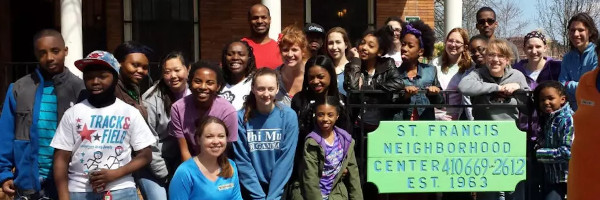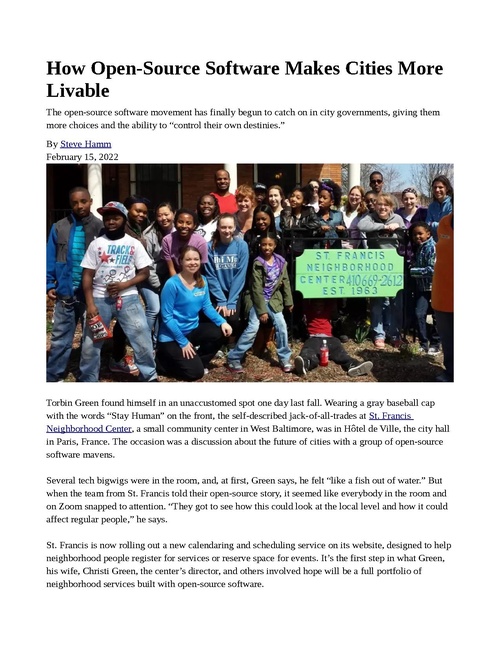How Open-Source Software Makes Cities More Livable
| News | |
| Image | 
|
|---|---|
| Published | 2022-02-16 |
| Point(s) of Contact | |
| Organization(s) | St. Francis Neighborhood Center |
| Where | Baltimore MD |
| Display | Yes |

| |
St. Francis is now rolling out a new calendaring and scheduling service on its website, designed to help neighborhood people register for services or reserve space for events.
St. Francis is now rolling out a new calendaring and scheduling service on its website, designed to help neighborhood people register for services or reserve space for events. It’s the first step in what Green, his wife, Christi Green, the center’s director, and others involved hope will be a full portfolio of neighborhood services built with open-source software.
In itself, a new interactive feature on a non-profit website is hardly big news. But this one represents a couple of trends that, over time, could have a major impact on cities all over the world and on the people who live in them.
The open-source software movement, which has transformed how software is created and used in the business world, has finally begun to catch on in cities. In addition, the St. Francis story shows how unusual partnerships can help catalyze open-source adoption and multi-stakeholder collaboration in cities.
Tiny St. Francis has now formed an alliance with nearby Johns Hopkins University and the IT department of the city of Paris to push its open-source agenda. Those involved hope it becomes a model for other such collaborations. “It’s wonderful to see this come together,” says Sayeed Choudhury, associate dean for Research Data Management and director of the Open Source Programs Office (OSPO) at Johns Hopkins. “There’s a lot of interest in communities becoming more sustainable and resilient, healthier, and more economically vibrant. I’m looking at the potential for open source software and new approaches to collaboration to help out.”
This story has its roots back in the early 2000s, when Paris’ IT department began building some of the city’s websites using open-source software. The platform they created is called Lutece, the name of the ancient Roman city that sat where modern-day Paris is now. Lutece now runs more than 300 web services, spanning everything from permits and housing to the city’s participatory budget portal—where residents weigh in on spending an annual $150 million budget.
Paris is now establishing the first city OSPO in Europe. The office coordinates all of the city’s open-source projects and assets—which saves money and minimizes duplication of efforts. “It helps us be aware and manage the software,” says Philippe Bareille, Paris’ OSPO manager. “Let’s start doing open-source in a more organized and framed way.”